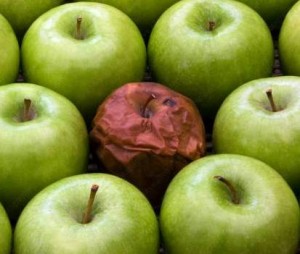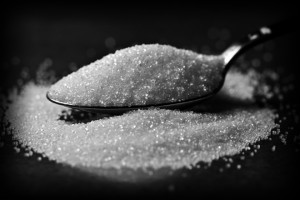Having blue eyes I am a eye-color-minority in my predominately brown eyed Italian family and being such I always used the excuse that my lighter eyes were sensitive to the sun when reaching for sunglasses before a dinner outside. Without them I would be continuously squinting which would give me a headache and make my eyes tear up. Why did the sun not seem to irritate their eyes as it did to mine?
Scientifically, yes lighter colored eyes are more sensitive to bright lights and the sun because a lighter color iris allows more light to pass into the retina of the eye. Lighter color eyes such as blue or light green are intact missing a pigment called melanin or have much less of it than a darker brown or hazel eye. In fact the amount of melanin in the eye determines it’s color; the more melanin the darker the eye color, the less melanin the lighter the eye color.
As this diagram shows the color of a person’s eyes is directly caused by the amount of the pigment melanin is present in the eye. In eyes of lighter color with less pigment the light is able to pass more easily through the iris. With the presence of melanin comes a sort of protective filter which acts to reflect light out of the eye consequently allowing the eye to be less aggravated by brighter light. Because the lighter colored eyes have less protection from the sun (they let more UV ray in) those with light eyes are at a higher risk for eye cancer (Vann). It is suggested that people with light eyes wear sunglasses often, with UV ray protection. Although it has not been proven that people with blue or green or gray eyes who have eye cancer developed it as a direct result from UV ray exposure there is a strong link or correlation; it seems to make sense. Because people with lighter colored eyes have less of the pigment they have more areas of their eye exposed to the sun and dangerous UV rays. There is less of a barrier between lighter eyes and forces in nature that may negatively impact the exposed or uncovered eye.
One interesting study I found relating to eye color was a study done which found that people with darker eye colors were more agreeable than those with lighter eyes. The study however was conducted in Australia. “Researchers surveyed 336 participants, 63 percent of whom were Northern European in ancestry” (Brice). The participants of the study were asked to answer questionnaires that measured aspects of their personalities like agreeableness and conscientiousness. The correlation of darker eyes and a more agreeable personality only applied to Northern Europeans, not any other Europeans from the south or east. Overall I’d have to say the link between eye color and personality is extremely weak. There is only a small correlation and I would argue it’s even just do to chance since the study was rather small and the correlation was only found in a certain group of people from a geographical area.
What I took away from this study that if you have lighter colored eyes it would be a good idea to wear sunglasses with UV protection on a sunny day.
Sources
http://www.dukemedicine.org/blog/#!/myth-or-fact-people-light-eyes-are-more-sensitive-sunlight
http://qi.epfl.ch/en/sondage/show/92/
http://www.everydayhealth.com/vision-center/does-eye-color-reveal-health-risks.aspx
http://www.knowledgesalad.com/useful/light-colored-eyes-really-sensitive-bright-light/
http://www.medicaldaily.com/eye-color-can-be-window-your-personality-242560










